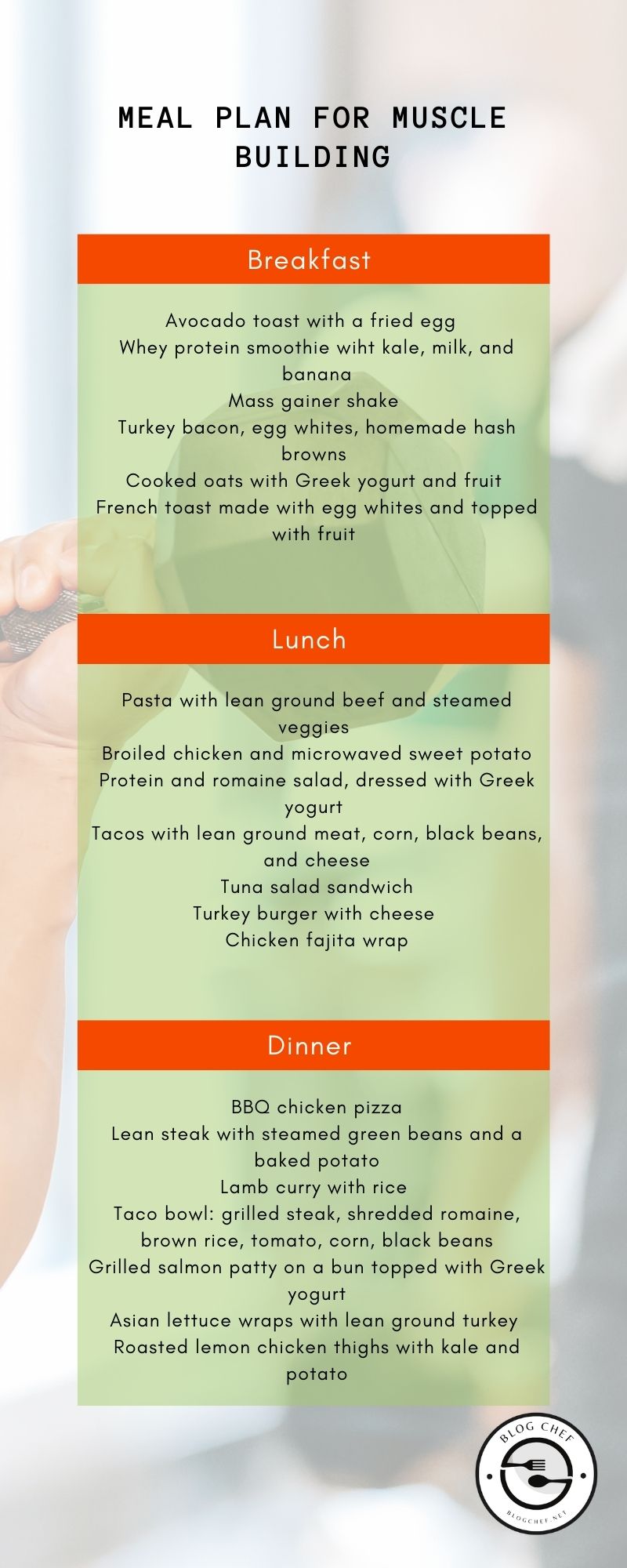Looking for a workable meal plan for muscle building?
Bulking can be a core aspect of your training routine, whether you’re a beginner, a professional bodybuilder, or an intense workout enthusiast looking to increase muscle mass. In that case, you need a meal plan that delivers maximum nutritious calories.
Maintaining a high-calorie diet that’s also healthy can be a challenge. Read on the learn how you can support your muscle mass goals with the right foods, without feeling like you need to eat constantly.
High-calorie meal plan for muscle building
During bulking, experts recommend increasing caloric intake by up to 20% for natural bodybuilding. Keeping in mind that everyone’s different, the calorie increase you require depends on your body and metabolism, the nature of your workouts, and your experience level. In other words, what works for me may not work for you.

The trick is picking an ideal meal plan, sticking to it, and being consistent. Only then can you know if it that meal plan is effective in your bulking journey.
Daily guidelines
Some daily guidelines to start with are:
- Eat 1 gram or more of protein per pound of bodyweight.
- Eat 1-2 grams of carbohydrates per pound of bodyweight.
- Eat less than 1 gram of fats per pound of bodyweight.
- Proportionally, strive to get 40% of daily calories from carbs, 30% from protein, and 10% from fat.
You can then adjust from there if you’re not seeing the results you want. Seeing some extra belly fat? Cut back on the carbs. No change in muscle mass? Then eat more of everything.
To help you lock in on your own personalized meal plan for muscle building, let’s touch on some high-calorie foods you can eat for breakfast, lunch, and dinner.
What to eat for breakfast to build muscle
| Food | Nutrients |
| Avocado toast with a fried egg | Carbohydrates, protein, fat, vitamin A, iron, and calcium |
| Whey protein, kale, milk, and banana smoothie | Carbohydrates, protein, fat, vitamin A, iron, and calcium |
| Mass gainer shakes and pre-workout supplements | Carbohydrates, protein, fat, fiber, and potassium creatine |
| Turkey bacon and egg whites | Carbohydrates, protein, fat, iron, and sodium |
| Turkey sausage and egg whites | Carbohydrates, protein, fat |
| French toast made with egg whites, topped with fruit | Carbohydrates, protein, fat, vitamin A and vitamin D |
| Oats with fruit and Greek yogurt | Carbohydrates, protein, fat |
A french toast breakfast is a popular choice for bulking because it is calorie-rich. You can combine your toast with egg whites, turkey bacon, or turkey sausage.
Eggs have a high amount of quality protein, which is quickly synthesized in the body. But opt for poached eggs unless you have a nonstick pan that’ll cook eggs without tons of butter or oil.
If you don’t have time to prepare breakfast, a smoothie or shake is a suitable substitute. A well-balanced smoothie should provide carbs for energy plus at least one protein source, such as egg whites, milk, or whey protein.
A full English breakfast can provide your body with bulking calories, too. Slices of bacon, plus eggs and sausage will deliver lots of protein. Unfortunately, these traditional breakfasts are also high in saturated fats. For that reason, it’s best to reach for turkey bacon, turkey sausage, and egg whites.
Greek yogurt is another option that’s high in protein and lower in fat. Combine it with fruit and/or cooked oats for carbs.
What to eat for lunch to build muscle
| Food | Nutrients |
| Pasta with lean ground beef and steamed veggies | Carbohydrates, protein, fat, iron, and sodium |
| Broiled chicken and microwaved sweet potato | Carbohydrates, protein, vitamin A |
| Your favorite protein and romaine salad, dressed with Greek yogurt and lemon juice | Carbohydrates, protein, fat |
| Tacos with lean ground meat, corn, black beans, and cheese | Carbohydrates, protein, fat, potassium, magnesium, iron |
| Tuna salad sandwich | Carbohydrates, protein, fat, vitamin A, vitamin B12, niacin, and vitamin B6 |
| Turkey burger with cheese | Carbohydrates, protein, fat, B vitamins |
| Chicken fajita wrap | Carbohydrates, protein, fat, Vitamin C, Vitamin A, sodium, iron, potassium, and calcium |
A homemade pasta dish with noodles, lean ground beef, steamed veggies, and a dash of olive oil is well-rounded choice for lunch. Even better, you can eat this dish hot or cold.
Other make-head choices for lunch include a tuna salad sandwich, romaine salad with protein, or a cold chicken fajita wrap. For your salad dressing, try using Greek yogurt, mayonnaise made from avocados, or a quick vinaigrette. These are healthier choices than bottled salad dressing.
If you’re near a kitchen at lunchtime, broil a chicken breast or air fry a turkey burger. You can enjoy either with a microwaved sweet potato on the side.
What to eat for dinner to build muscle
| Type | Nutrients |
| BBQ chicken pizza | Carbohydrates, protein, fat, sodium, calcium |
| Lean steak with steamed green beans and a baked potato | Carbohydrates, protein, fat, iron, vitamin C, calcium, potassium |
| Lamb curry with rice | Carbohydrates, protein, fat, iron, potassium |
| Taco bowl: grilled steak, shredded romaine, brown rice, tomatoes, corn, black beans | Carbohydrates, protein, fat, potassium, magnesium, iron |
| Grilled salmon patty on a bun topped with Greek yogurt | Carbohydrates, protein, fat, omega 3 fatty acids, calcium |
| Asian lettuce wraps with lean ground turkey | Carbohydrates, protein, potassium, calcium |
| Roasted lemon chicken thighs with kale and potato | Carbohydrates, protein, fat, vitamin C, vitamin A, calcium potassium, iron |
The formula for a good muscle-bulking dinner is protein, starch, and vegetable. You can get that from:
- Stir fry served on rice
- Grilled steak with a baked potato and your vegetable of choice
- A burger or other protein-heavy sandwich served with green beans or carrots
- Chili seasoned grilled meat with rice, black beans, and a salad
- Spicy curries served on rice
Most people have more time to experiment with their dinner recipes than with breakfast or lunch. Use that time to identify the foods and flavors you love. If you’re into spicy foods, try out Indian recipes. If you prefer more traditional flavors, fire up the barbecue and grill lean cuts of meat plus some corn cobs and potatoes in foil.

Extra tips for building muscle
Besides the main meals, your meal can also include healthy snacks such as:
- Peanut butter sandwiches
- Raw nuts and berries
- Avocado toast
- Peanut bars
- Protein bars
- Cereal bars
Note that you may have to moderate your intake of high fiber foods and foods with high water content. Examples are whole grains, fruits, and vegetables. These are nutritious choices, but they can reduce your hunger. If you’re finding you can’t eat enough in a day to reach your goals, try cutting back on those high fiber options. See if that helps you maintain a stronger appetite.
Fueling your muscle mass goals
Your best meal plan for building muscle will revolve around high-calorie foods that are nutritious. Look to achieve a good balance across the macronutrients — proteins, carbs, and fats. Protein builds muscle and carbs keep your body from depleting the muscle you already have. Research concludes that creatine, a compound found in in animal proteins, supports muscle development and strength. Fat adds calories, which you need as fuel.
You also need essential micronutrients to build muscle while keeping your energy levels up. Magnesium, calcium, iron, potassium, vitamin B12, glutamine, vitamin D, and omega 3 fatty acids are good ones to target in your meal plan for muscle building.
If you’re a picky eater, you may have trouble consuming everything you need to gain mass. In that case, you can opt for pre-workout supplements — many have creatine-based formulas optimized for muscle growth.
One final word of advice. Before adopting a meal plan for muscle building, please get a physical and consult with your physician. A doc’s advice can help you get started on a plan that’s sustainable and good for you.
You may also find some good food ideas in our heart-healthy meal plan. If you’re looking for meal plan for muscle building and weight loss, see our post here.
